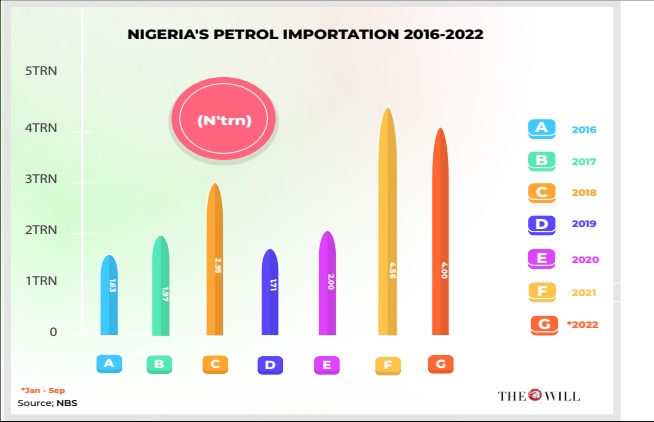July 08, (THEWILL) – The Nigerian National Petroleum Company Limited (NNPCL) recently said it had declared war against the challenges affecting the country’s oil production and called for collaboration between stakeholders in the oil and gas industry in the fight.
The Group Chief Executive Officer of NNPC Ltd, Mr. Mele Kyari, revealed this during his keynote address at the opening ceremony of the 23rd Nigeria Oil & Gas Conference and Exhibition (NOG Energy Week) in Abuja on July 2, 2024..
He stated that a detailed analysis of assets revealed Nigeria can produce two million barrels of crude oil per day without deploying new rigs, but the major impediment is the industry’s inability to act promptly.
Kyari added that the “war” will help NNPC Ltd. and its partners swiftly remove all identified obstacles to effective and efficient production, such as delays in procurement processes, which have become a significant challenge in the industry.
The declaration of “war” hinges on the nation’s receding oil fortune. In 2024 so far, Nigeria has failed to meet its production target in the first five months of the year. The country’s plan to produce 1.78 million barrels of crude oil per day was initially hindered by the Organization of Petroleum Exporting Countries and its allies (OPEC+), which set a production quota of 1.5 million barrels per day in December, 288,000 barrels below the budget target.
In January, OPEC figures revealed that Nigeria’s average crude oil production was 1.42 million barrels per day, falling short of both the OPEC quota and the budget target. This figure dropped to 1.32 million barrels per day in February and further declined to 1.23 million barrels per day, according to direct communication figures from OPEC.
In the first quarter of the year, Nigeria, similar to 2023, failed to meet the OPEC+ production quota and the 2024 budget production target, with average production barely reaching 1.4 million barrels per day.
The fact remains, however, that NNPC Ltd, as the nation’s oil company, is at war with itself because Nigeria’s major economic challenge today hinges on poor energy security and the origin is traceable to NNPC Ltd.
From policy inconsistency – a euphemism for corruption, to operational hegemony that thrives on opaqueness, the citizens have borne the brunt of importation of poor quality petrol, indiscriminate hike in pump price of fuel, and now pay the price for controversial fuel subsidy which was entangled in the most questionable process.
It is these factors that embolden NNPC Ltd to operate in a manner that created the “enemies” it now wants to go to “war” against.
 This NNPC Ltd superintended over an industry that witnessed the worst oil theft in the nation’s energy history. It is on record that NNPC Ltd did not remit a dime to FAAC in 2022 because the nation lost about $10 billion through oil theft. The NNP Ltd released this data.
This NNPC Ltd superintended over an industry that witnessed the worst oil theft in the nation’s energy history. It is on record that NNPC Ltd did not remit a dime to FAAC in 2022 because the nation lost about $10 billion through oil theft. The NNP Ltd released this data.
According to industry experts, the mass exodus of international oil companies (IOCs) from Nigeria hinges on the character of the NNPC Ltd leadership and operational disharmony the has persisted despite the unbundling of the firm into a profit-oriented company detached from the apron-string of the government.
It must be emphasised that NNPC Ltd is embarking on this ”war” with its four refineries lying dormant for many years, yet consuming huge resources in endless maintenance process.
THEWILL recalls that NNPC Ltd had in July 2023 promised that the Port Harcourt Refinery would resume production in December of that year.
While Nigerians awaited the outcome of the promise, the Senate on October 24, constituted an ad-hoc committee to investigate all contracts estimated at over N11.35 trillion awarded for the rehabilitation of the four moribund refineries in the country. Senator Uba was a member of the ad-hoc committee which had not submitted its report after the four-week deadline.
THEWILL further recalls that former President Muhammadu Buhari failed to meet the deadline for the rehabilitation of the Port Harcourt Refinery which was set for the first quarter of 2023.
On January 9, 2023, former Minister of State for Petroleum, Timipre Sylva, revealed that the rehabilitation of the 60,000 bpd refinery was being completed and was going to be started by Q1 2023, a statement corroborated by NNPCL CEO, Mele Kyari. The refinery was initially scheduled to commence operations in December 2022.
“Our promise has been that the 60,000 bpd plant within the Port Harcourt refinery by the end of Q4 2022, it is being completed and is going to be started by Q1 2023 as promised,” Sylva said while giving an update on the Port Harcourt refineries during the ministry of petroleum resources 2022 scorecard in Abuja.
Of major concern are the huge public funds committed to the rehabilitation of the old refinery, which is part of the larger Port Harcourt refinery complex. Equally worrying is the government’s attitude of embracing opaqueness in its oil and gas business.
This followed the Federal Executive Council’s (FEC) approval of $1.5 billion (about N600 billion) in March 2021 for the rehabilitation of the Port Harcourt refinery complex, comprising the old and the new refineries.
Sylva said the contract was awarded to an Italian company, Tecnimont SPA, who, according to him, are experts in refinery maintenance.
Sylva further disclosed that the funding of the repairs would be from many components, including NNPCL, Internally Generated Revenue (IGR), budgetary provisions and Afreximbank.
“So we are happy to announce that the rehabilitation of the refinery will commence in three phases. The first phase is to be completed in 18 months, which will take the refinery to a production of 90 percent of its nameplate capacity.
“The second phase is to be completed in 24 months and all the final stages will be completed in 44 months and consultations are approved. And I believe that this is good news for Nigeria,” the minister said, adding that a maintenance company would also be put in place to ensure an effective maintenance culture.
The minister assured that rehabilitation works on Kaduna and Warri refineries would also be carried out on or before May 2023.
This top-of-the-roof optimism ended in a crashed hope with Nigerians suffering and paying more for petrol, directly and indirectly. Besides, the government has not been held to account for the “unending refinery rehabilitation” which has gulped a huge chunk of public fund.
The approval of the $1.5 billion to rehabilitate the refineries was not received as good news. It was promptly greeted with mixed feelings as the country had in the past spent billions of dollars on refinery maintenance. Despite such expenditure, however, the facilities have not worked with many experts calling for their privatisation.
Notwithstanding their moribund state, the refineries spend billions of naira on salaries, wages and other benefits on workers despite producing no refined product in recent years.
For instance, the Port Harcourt refinery reported no income in 2020 but incurred administrative expenses of N19.22 billion, according to its audited reports. The refinery employed 487 new staff members in 2020. Its directors received N99.75 million as emoluments in 2020, a 67 percent increase from N59.66 million in 2019.
The workers, among the highest paid in the country, earn their salaries, promotions, allowances and go on local and foreign training programmes while the facilities are idle.
Timipre Sylva had said that “the incoming government would continue from where this administration stopped in fixing the refineries because government is continuum”.
Commenting on the state of the refineries, an oil and gas expert, Engr Bala Zaka said, “No society succeeds on corruption, waste and pursuit of parochial interest.
James Ikungbomire,, an economist and entrepreneur, said the lawmakers must be looking for something we do not know, or targeting an individual or group of persons to witch-hunt.
He recalled that Nigeria lived practically on borrowing during Buhari’s administration as the economy was hemorrhaging from massive oil theft and stealing under the guise of oil subsidy payment.
Sam Diala is a Bloomberg Certified Financial Journalist with over a decade of experience in reporting Business and Economy. He is Business Editor at THEWILL Newspaper, and believes that work, not wishes, creates wealth.







